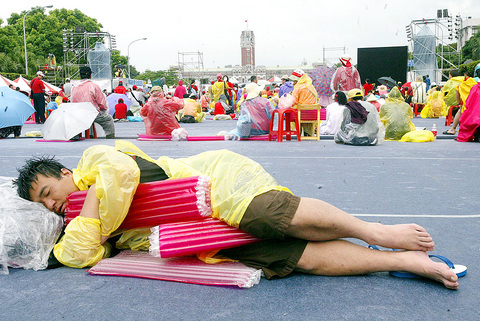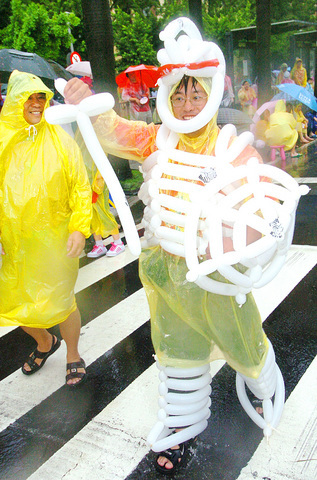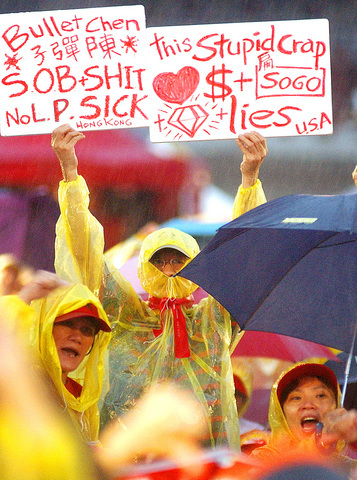Rain continued to dampen the enthusiasm of demonstrators yesterday as the around-the-clock sit-in staged to oust President Chen Shui-bian (陳水扁) entered its second day.
Despite the fact that there were visibly smaller crowds than on Saturday, the organizers claimed that even more people had shown up than on the first day of the protest.
They said that 500,000 protesters had shown up on Ketagalan Boulevard yesterday, after saying 300,000 had taken part on Saturday.

PHOTO: CNA
Taipei City Police Department's Zhongzheng First Police District estimated the crowd at 10,000 people yesterday, and around 100,000 on Saturday.
A plan for demonstrators to form imitation "Nazca lines" at 3pm was suspended due to heavy rain and lack of people.
Former Democratic Progressive Party (DPP) chairman Shih Ming-teh (

PHOTO: CHEN TSE-MING, TAIPEI TIMES
The Central Weather Bureau has warned of more rain to come over the next couple of days, but Shih called on supporters to come out and not to miss the historic event.
"I realize the protest is a long battle, so I will be with them until the day we triumph," he told a press conference held yesterday morning at the Mayor's Salon, an art gallery near Ketagalan Boulevard.
Some protesters, however, complained that Shih did not stay with them all night and that he had slept in an air-conditioned trailer while they slept on the street.

PHOTO: PATRICK LIN, AFP
Shih, claiming that he was diagnosed with liver cancer about two months ago, asked supporters to give him time to rest because he was, after all, just a human being.
He also proposed that demonstrators take shifts staging the sit-in.
When asked whether he had received any medical attention as claimed by Chang Fu-chung (張富忠), a campaign spokesman, the 65-year-old Shih refused to confirm or deny the claim, saying only "a warrior cannot use his age or health as an excuse."
Chen said in Hualien yesterday that he was worried about Shih's health and hoped that Shih and demonstrators watched their health and that they did not get sick.
"We are mortal and we are fragile. We must be humble in front of God and reflect on the mistakes we make," Chen said.
"A-bian has experienced many frustrations and difficulties, but no matter how serious they are, I was never defeated. That is why I had the opportunity to become the president," he said.
Chen said that he knew many people were not happy with him and his administration, but said that it was a democratic norm to express different opinions.
"We listen to the criticism with an open mind and we respect the way people voice their grievances in any form," he said.
Shih said that he was satisfied with the demonstration because every protester participated voluntarily and did not abandon the cause because of the rain.
When asked whether any improvements needed to be made in the rally, Shih said speakers should be more careful in choosing their words.
He was referring to a slip of tongue by Wang Lie-ping (
Wang was booed off of the podium on Saturday when she said that "we, the people of the Republic of Taiwan" were not afraid of the rain -- a remark that angered the multitude of pan-blue supporters who believe Taiwan should be called the "Republic of China."
Shih dismissed a pledge Chen made in Tainan Country on Saturday -- to dedicate himself to three tasks during the remainder of his term -- as a "fraud."
"He shouldn't try to deceive the public with something that he cannot deliver," Shih said. "He should have told the people of Taiwan truthfully that it will take tremendous amount of time and effort to join the UN."
Chen pledged in his hometown in Tainan County that in the remaining 20 months of his term, he would work to strengthen the country's bid to joint the UN under the name "Taiwan," promote a new constitution and hold a referendum on the Chinese Nationalist Party's (KMT) stolen assets.
Regarding the KMT's assets, Shih said that he was in favor of the move but wondered why the administration did not act earlier.
"I proposed to President Chen that he could form a task force similar to South Africa's truth reconciliation committee to deal with the KMT's party assets and I told him that I could help if he needed me, but nothing happened," Shih said.
"Now he brings up the issue again. It is to me nothing but a political tool aimed at tricking the public and saving his career," Shih said.
He urged political leaders, including the DPP, to sit down and talk about the country's future in the "post-A-bian era."
He said former president Lee Teng-hui (
He also dismissed the speculation that the anti-Chen protest was aimed at seizing power, saying the DPP would still be power since Vice President Annette Lu (
Writer Lung Ying-tai (
Meanwhile, Shih's headquarter agreed late last night to a police proposal to reopen several lanes of Ketagalan Boulevard to regular traffic starting at 10pm last night.
Demonstrators will now only be allowed to use three lanes and the sidewalks on the boulevard, as well as the area in front of the Taipei Guest House.
The police may also remove some of the barricades in front of the Presidential Office if the protests continue as they have, the report said.
Additional reporting by Flora Wang
also see story:
Editorial: FSC might be trying too hard

CHAOS: Iranians took to the streets playing celebratory music after reports of Khamenei’s death on Saturday, while mourners also gathered in Tehran yesterday Iranian Supreme Leader Ayatollah Ali Khamenei was killed in a major attack on Iran launched by Israel and the US, throwing the future of the Islamic republic into doubt and raising the risk of regional instability. Iranian state television and the state-run IRNA news agency announced the 86-year-old’s death early yesterday. US President Donald Trump said it gave Iranians their “greatest chance” to “take back” their country. The announcements came after a joint US and Israeli aerial bombardment that targeted Iranian military and governmental sites. Trump said the “heavy and pinpoint bombing” would continue through the week or as long

TRUST: The KMT said it respected the US’ timing and considerations, and hoped it would continue to honor its commitments to helping Taiwan bolster its defenses and deterrence US President Donald Trump is delaying a multibillion-dollar arms sale to Taiwan to ensure his visit to Beijing is successful, a New York Times report said. The weapons sales package has stalled in the US Department of State, the report said, citing US officials it did not identify. The White House has told agencies not to push forward ahead of Trump’s meeting with Chinese President Xi Jinping (習近平), it said. The two last month held a phone call to discuss trade and geopolitical flashpoints ahead of the summit. Xi raised the Taiwan issue and urged the US to handle arms sales to

State-run CPC Corp, Taiwan (CPC, 台灣中油) yesterday said that it had confirmed on Saturday night with its liquefied natural gas (LNG) and crude oil suppliers that shipments are proceeding as scheduled and that domestic supplies remain unaffected. The CPC yesterday announced the gasoline and diesel prices will rise by NT$0.2 and NT$0.4 per liter, respectively, starting Monday, citing Middle East tensions and blizzards in the eastern United States. CPC also iterated it has been reducing the proportion of crude oil imports from the Middle East and diversifying its supply sources in the past few years in response to geopolitical risks, expanding

Pro-democracy media tycoon Jimmy Lai’s (黎智英) fraud conviction and prison sentence were yesterday overturned by a Hong Kong court, in a surprise legal decision that comes soon after Lai was jailed for 20 years on a separate national security charge. Judges Jeremy Poon (潘兆初), Anthea Pang (彭寶琴) and Derek Pang (彭偉昌) said in the judgement that they allowed the appeal from Lai, and another defendant in the case, to proceed, as a lower court judge had “erred.” “The Court of Appeal gave them leave to appeal against their conviction, allowed their appeals, quashed the convictions and set aside the sentences,” the judges